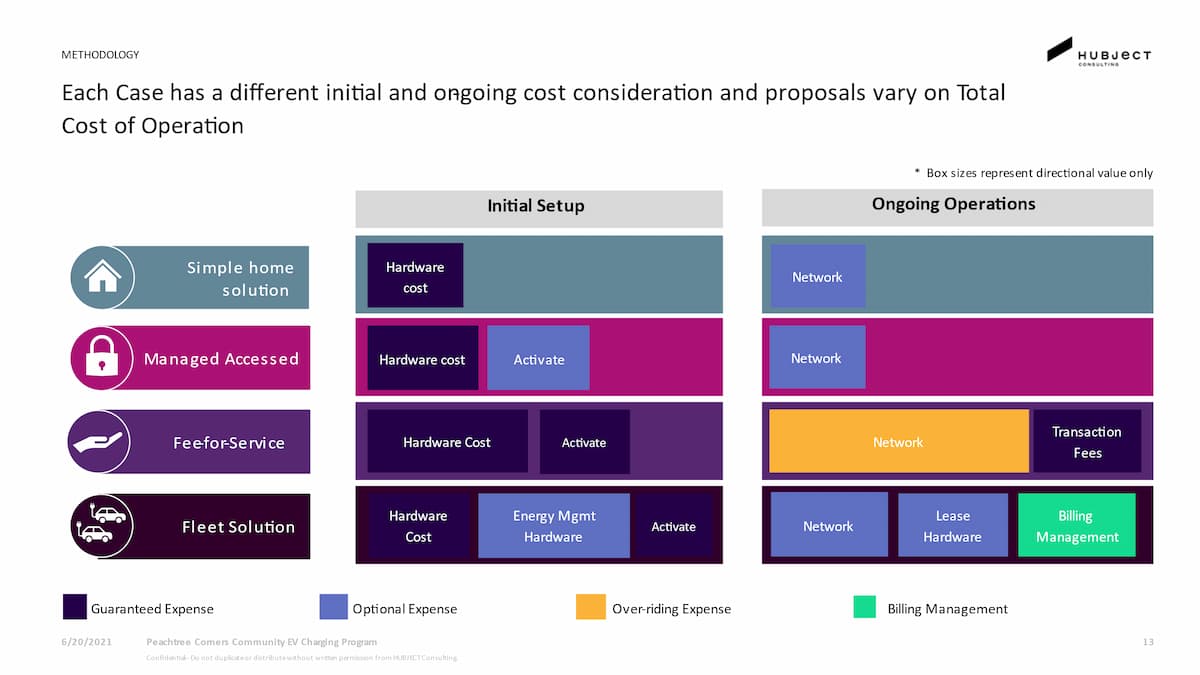I’m a business, what are some things I need to think about?
July 8, 2021
Traditional – Traditional charging stations (also called EVSE or electric vehicle supply equipment) are stations that are uncomplicated and easy to use. You simply plug the cord into the outlet on the vehicle and walk away. There may be lights on the stations that show that the station is on, off or charging.
Some electric vehicles have a feature that allows the owner to schedule vehicle charging using the information center in the vehicle or on a smart phone app. You may also get reminders if charging is supposed to start and the vehicle is not plugged.
Smart Station – Charge station manufacturers now sell stations that are called ‘smart’ stations. These stations are equipped to work with cell phone apps that allow owners schedule charging, see charging status and get reminders. Some of these stations/apps work with Alexa or Google Home for you to manage your EV charging.
Access Only – At times a facility wants to control who is able to use charging stations and get station usage reports but doesn’t want to charge a fee for the service. It seems like there should be an option between installing stations that anyone can use, putting stations behind a wall or gate and paying for an expensive network when you don’t want to charge to use them. That’s where Access Only options come in. Two ways to accomplish this are using 1) Bluetooth equipped stations with a user app for access or 2) Network that only charges a fee when you charge for the service (transaction fee) but no/low network fee.
Network – When advanced energy, access and user features are needed, owners install networked stations. In addition to managing access, networks allow stations owners to recoup part of the cost of installing and managing the networks and to encourage drivers to move their vehicles by changing fees the longer the vehicle is plugged in. Drivers can typically find available stations and pay for a charging session using a smart phone app.
Fleet Only – Businesses that are converting to electrified vehicles have different concerns than those businesses that are installing stations for employees, apartment residents or shoppers so their solution set may need to be different as well. Business owners may be concerned about the power they are using or they may need certain vehicles to be fully charged before others. This is where Fleet Only options come in. Fleet Only options allow for businesses to better manage how and when the fleet is charged to ensure vehicles are fully charged when expected and to manage power utilization to manage utility costs for not only the stations but for the entire facility.
If a business has a small number of vehicles, traditional or access only options may be sufficient to meet their charging needs but the business should plan for future growth by either installing a low cost or flexible stations.

Georgia Power Business EV Charger Installation
Click here to read about Georgia Power’s Electric Vehicle FAQ’s.
$500 Per Charger
Georgia Power business customers may qualify for a $500 rebate for each new 208/240-volt Level 2 charger with dedicated circuit purchased and installed. Submit a rebate request form with a copy of paid installation, charger invoice(s) and current W-9 form within 60 days after the EV charger has been installed. For the detailed terms & conditions, click here.
Download rebate request form (Expires December 31, 2021).
Average EV Charging Stations Cost $6,000 Installed
How much do EV charging stations cost?
The average cost to purchase equipment and install a commercial grade, level 2 EV charging station is around $6,000.
Lower end equipment with minimal installation requirements can cost around $2,500. Higher end level 2 EV charging stations can run $10,000 to $13,000 fully installed. While the average cost of an EV charging station is $6,000, there are many ways this number can be significantly higher or lower.
Installation Drives EV Charging Station Costs
Since EV charging station equipment costs are static, the major cost variable is installation. Installation costs can be broken down into two categories, time and materials.
Installation should only be performed by a licensed electrician. Depending on location their labor costs can range from $70 to $100+ per hour. Unfortunately there is not set amount of time it should take to install an EV station. At some properties it can take 2 hours, at others it could take over 20.
Installation materials drive cost because a property’s electrical infrastructure determines how difficult it will be to install an EV charging station. Running 20 feet of conduit and wiring to an existing panel with capacity to handle the charger can take less than 3 hours. Older properties might require 100+ feet of conduit and wiring, installing a new circuit breaker or even worse an electrical panel upgrade. If often makes sense to get an installation bid from a qualified electrician before purchasing equipment.